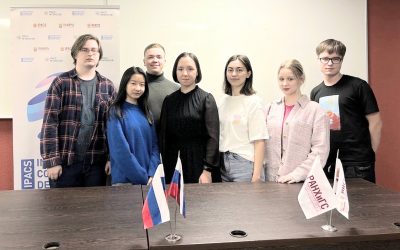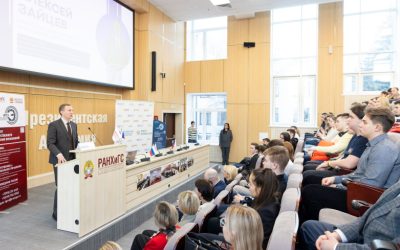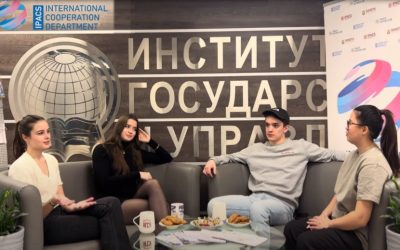Description
The first program in Russia in the field of ecosystem management – systems of living environment (cities, villages, regions, country, large agglomerations, integration associations), taking into account the interdependence of management, human, natural, energy, bio and other resources).
Modern, high-quality and prestigious education in the direction of “State and municipal management”. It is implemented in English when studying at a partner University.
Acquired qualification: bachelor.
Admission is based on secondary education on the basis of the results of the Russian unified state exam evaluated on a scale of one hundred points (mathematics (profile), Russian, social science). On the basis of vocational secondary education or higher education – according to the results of entrance examinations conducted by the Academy independently.
Study language:
- English;
- Dutch (optional, on the basis of Nuffic Neso Russia (Dutch educational center).
Foreign partner:
- Nuffic Neso Russia (Dutch educational center and University of Groningen)
PROFESSIONAL ACTIVITY
- system of state, regional and municipal authorities;
- law enforcement and supervisory authorities, including institutions of control over the use and protection of land, organs of supervision over the observance of hunting rules in the territory of the state hunting fund, institutions of fish protection, bodies of state forest protection, bodies of sanitary and epidemiological supervision, exercising control over the implementation of relevant laws, regulations, standards;
- analytical research structures focused on the conservation and maintenance of balanced ecosystems;
- international and Russian commercial and non-profit organizations in need of specialists capable of ensuring the regulation of sustainable development of the living environment, taking into account the state and forecast of development of resources (natural, climatic, environmental, demographic, intellectual, innovative and other), in view to global and local risks and threats.
For more detailed information, you can contact the international curator of the program:
- Karolina Sikirinskaya, Deputy Head of the International Cooperation Department, Deputy Director of the Russian-Italian Center IPACS RANEPA
+ 7 (499) 956-94-37, +7 (926) 940-66-95; email: sikirinskaya-ka@ranepa.ru
Competences and advantages
Program advantages:
- actual profile of training – for the first time the program combining studying of problems of development of ecosystems and mechanisms of state regulation of these processes is offered;
- graduates are preparing to solve the latest, complicated and current problems of state and municipal management (preservation of the country’s strategic resources, renewable energy sources, reduction of anthropogenic load on the ecosystem of megacities, development of the state system of specially protected natural areas, biodiversity conservation, formation of eco-comfortable conditions for life, preservation of human health and efficiency, etc.);
- graduates of the program are formed with the knowledge of international standards for assessing the ecological state of the environment, the ability to assess the best foreign and russian practices for the analysis and forecasting of ecosystems;
- graduates develop ecological thinking, understanding of the relationship of decisions with the prospects for the development of the living environment, the state of society, the biosphere and natural functions of the managed system, human resources, the welfare of residents;
- the educational process is aimed at the intensification of training, the active use of technologies of problem (project) training;
- study of foreign languages for the purpose of access to foreign sources of information, exchange of experience with foreign partners, ensuring competitive advantages in the labor market;
- providing students with places of practice, including long-term pre-diploma practice in specialized organizations;
- opportunity to study at foreign universities, academic student mobility (student exchange) programs, foreign internships;
- participation in research conducted by the Academy and potential employers, opportunities for publications in scientific journals;
- the prospect of further study in the Russian and foreign master’s programs, in double degree programs.
We create conditions in which each student has the opportunity to early inclusion in the practice of monitoring, forecasting and management of ecosystems.
COMPETENCIES OF GRADUATES
- able to develop public policy frameworks in conjunction with social, demographic, environmental, health, education, science, culture and innovation policies;
- have knowledge of risk management and ecosystem risk assessment skills;
- know the basics of state and municipal management of natural resources and environmental protection;
- are able to apply the norms of environmental law, international and national environmental standards, regulations of the system of standards “Nature protection”, are able to carry out environmental control;
- know the basic economics of ecosystems, including environmental economics; models of human well-being;
- have the skills and abilities to search and develop solutions to achieve social, technological, energy, raw materials, food, environmental security;
- know how to work in GIS (geographic information system), use its capabilities for management;
- know the basics of industrial ecology, are able to make environmental justification of design decisions when placing industrial facilities;
- know the international experience of processing and usage of production and consumption waste;
- have the skills to monitor, predict and model ecosystem development;
- possess technologies of development and promotion of environmental ideas in business;
- able to consultancy on sustainable ecosystem development.








